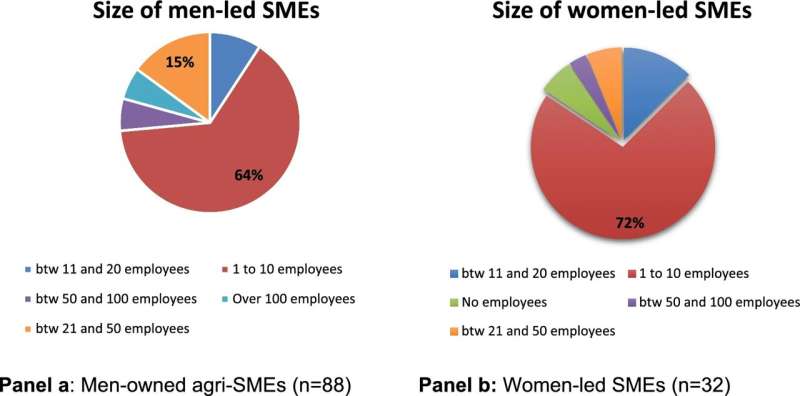This article has been reviewed according to Science X's editorial process and policies. Editors have highlighted the following attributes while ensuring the content's credibility:
fact-checked
proofread
Smallest agri-SMEs in Africa owner-managed by women bore the brunt of COVID-19, new study reveals

The smallest agri-SMEs in Africa owner-managed by women bore the brunt of the COVID-19 pandemic, according to new research led by a team of CABI scientists and published in the journal CABI Agriculture & Bioscience.
The researchers studied data from 119 agricultural small- and medium-sized enterprises (agri-SMEs)—ranging in size from sole proprietorships with one employee to those employing up to 100 people—across six different value chains in Ethiopia, Ghana, Malawi, Nigeria, Tanzania and Zimbabwe.
Value chains that formed part of the survey included—in order of aforementioned countries—rice, oil palm and cocoa, groundnuts, maize, cocoa and rice, rice and sunflower and maize.
Scientists from CABI's regional center for Africa in Nairobi, Kenya, and its center for West Africa in Accra, Ghana, found that while all agri-SMEs were negatively affected by COVID-19-associated restrictions, the size of the firm and gender of the owner-managers resulted in different impacts.
The smallest agri-SMEs, mainly owner-managed by women, were more likely to experience disruptions in marketing their goods and maintaining their labor supply.
Larger agri-SMEs, however, made changes to their business operations to comply with government guidelines during the pandemic and made investments to manage their labor supply—therefore, sustaining their business operations.
In terms of changes in business operations by agri-SMEs due to COVID-19 restrictions, 72% were affected by changes to market access and nearly 70% by health and safety changes. This included the wearing of face masks and hand washing. Labor supply changes affected 40% while 22% were impacted by financing and just over 10% made changes to how they package their products.
Furthermore, modeling results show that financing prior to the pandemic, engaging in primary agricultural production and being further from urban centers, significantly influenced the likelihood of a firm incurring business losses.
Dr. Mariam Kadzamira, Senior Researcher, Agribusiness at CABI and lead author of the research, said, "Our findings necessitate engendered multi-faceted agri-SME support packages that are tailored for smaller-sized agri-SMEs.
"Any such support package should include support for agri-SMEs to develop sustainable marketing strategies and help them secure flexible financing that considers payment deferrals and debt moratorium during bona fide market shocks such as the COVID-19 pandemic."
The study highlights that while sub-Saharan Africa has the highest female entrepreneurship rate globally, these women-led enterprises are more likely to be smaller, informal, and less profitable, with less growth potential than those operated by men.
A key recommendation from the research is that public and private sector entities facilitating entrepreneurship development should establish multi-faceted support packages that will cushion agri-SMEs in the aftermath of the COVID-19 pandemic to allow them to "bounce back."
Dr. Victor Clottey, co-author and Regional Representative, West Africa at CABI, said, "Support should be tailored for smaller-sized agri-SMEs as they are more vulnerable to shocks arising in the market."
"In addition, there is a need for innovative gendered support packages, as most enterprise owner-managed by women are likely to be smaller and hence more vulnerable."
"Any support package put in place should have a work package to support SMEs with developing sustainable marketing strategies and securing flexible financing that considers payment deferrals and debt moratorium for agri-SMEs in the event of a bona fide economic and/or market shock."
The scientists add that smaller-sized SMEs should be supported not only with financing but also with the capacity to diversify their business operations and income streams to enhance their resilience in the event of market and economic shocks such as the COVID-19 pandemic.
More information: Mariam A. T. J. Kadzamira et al, African agri-entrepreneurship in the face of the COVID-19 pandemic, CABI Agriculture and Bioscience (2023). DOI: 10.1186/s43170-023-00157-3
Provided by CABI




















